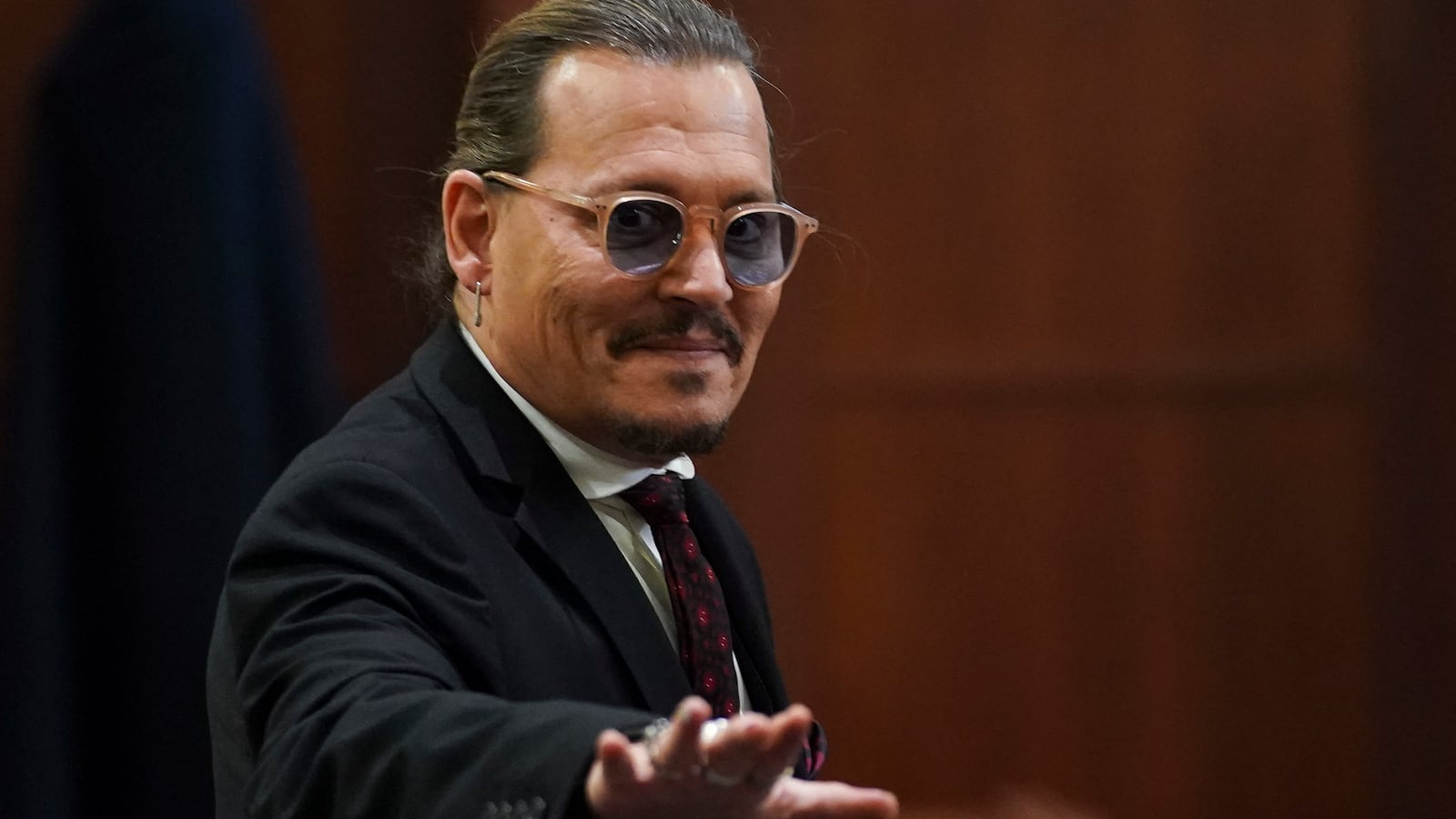On Wednesday afternoon—following a seven-week trial—a seven-person jury largely sided with Johnny Depp in his $50 million defamation suit against ex-wife Amber Heard, awarding him $10 million in compensatory damages and $5 million in punitive damages. (The latter amount was reduced to $350,000, Virginia’s statutory cap on punitive damages.)
They agreed with one part of Heard’s $100 million countersuit: That Depp’s former lawyer, Adam Waldman, smeared her by calling her allegations a “hoax.” She was awarded $2 million. They can still file post-trial motions to reduce the amount of money they owe each other, but for now, the $8 million gap is the clearest indication of what the jurors think.
Depp filed suit after Heard came forward as a survivor of domestic abuse in a 2018 Washington Post op-ed where she did not specifically name her abuser, arguing that the piece was disparaging and hurt his career. Heard subsequently countersued, reiterating her claims of violence at the hands of Depp. (Depp had previously lost a libel suit against tabloid The Sun in the U.K. over the paper labeling him a “wife beater,” with the judge finding that 12 of 14 incidents of domestic violence alleged by Heard had occurred.)
Some legal experts say it’s clear that Depp and his attorneys chose to file their suit in Virginia, a state Amber says she’d never visited before, because of the state’s weak protections against frivolous defamation suits.
Anti-SLAPP (strategic lawsuit against public participation) laws are supposed to stop rich and powerful people from burdening courts and defendants with meritless lawsuits.
Robert Sack, a senior judge at the United States Court of Appeals for the Second Circuit, says anti-SLAPP laws have become “a big deal” in defamation cases.
“You want to find a jurisdiction which will A, hold on to the case, and B, that doesn’t have an anti-SLAPP statute,” he told The Daily Beast.
Virginia’s anti-SLAPP laws are far weaker than California’s, which allow those accused of defamation to file a motion to dismiss the case before it even gets to trial. (After Wednesday’s verdict, Heard called the jury’s decision a “setback” for women to a time when “a woman who spoke up and spoke out could be publicly shamed and humiliated.”)
It’s not clear that a California judge would’ve tossed Depp’s case, and Sack says there are a few reasons why so many defamation cases happen in Virginia, including robust interstate commerce and its proximity to Washington, D.C.
Still, anti-SLAPP laws are something to consider.
“One reason being because they’re so strong and they differ so much from state to state,” he said. “So the fact that it’s very strong and can and does differ from state to state makes it a very good ground for a lot of recent litigation,” he explained, citing Rep. Devin Nunes of California, who chose Virginia as the jurisdiction for multiple defamation lawsuits against newspaper publisher McClatchy, GOP strategist Liz Mair, and Twitter.
But Bryan J. Swerling, an attorney in New York City who has tried defamation cases, cautions that people can’t just go “venue hunting.”
“You have to have a legitimate tie to the state,” he said.
Nunes said Twitter and McClatchy have users and readers in Virginia, and that Mair lived in and worked there.
Advocates for the #MeToo movement have long argued that Depp’s lawsuit could fuel a legal backlash to the movement, threatening women who speak up with huge legal fees and shattered reputations.
Depp’s lawsuit was complicated by the fact that he’s a three-time Oscar nominee who helmed a tentpole Disney franchise for more than a decade. Every day, adoring fans waited for him outside the courthouse in Fairfax County. They showered praise on his attorney, Camille Vasquez, and even made montages of the two whispering to each other in court set to love songs.
Heard, who is decades younger than Depp and lacks the same name recognition, was the subject of ridicule and bullying from her ex-husband’s fans.
“At this point it is difficult to assess the long-term effect this decision will have on defamation law and whether it will chill future speakers and writers from addressing potentially controversial issues. I think it might have a chilling effect,” said Roy Gutterman, a professor at Syracuse University’s Newhouse School and director of the Tully Center for Free Speech.

Amber Heard waits before the jury said that they believe she defamed ex-husband Johnny Depp, while announcing split verdicts in favor of both her ex-husband Johnny Depp and Heard on their claim and counter-claim in the Depp v. Heard civil defamation trial at the Fairfax County Circuit Courthouse in Fairfax, Virginia, on June 1, 2022.
Evelyn Hockstein/AFP/GettyNot everyone is convinced that the case will open the floodgates for defamation suits in Virginia.
“Virginia is OK as a state for defamation cases,” said Jeremiah Denton, a Virginia Beach attorney who primarily represents plaintiffs.
“A lot of people think our jurors are very conservative. I’ve won cases and I’ve lost cases. I think the law is pretty balanced for both sides.”
Beyond the implications for future lawsuits, some attorneys are perplexed by this particular verdict, which ruled in both Depp and Heard’s favor.
Denton says the $2 million given to Heard means that the judge decided that Depp’s former lawyer, who called her claims a “hoax,” was an agent of Depp’s as opposed to an independent contractor, who has the ability to control their own work.
“I don’t know why she made that ruling, but it’s curious to me,” Denton said.
Referring to the mixed verdict, Swerling added, “It seems a little murky.”






